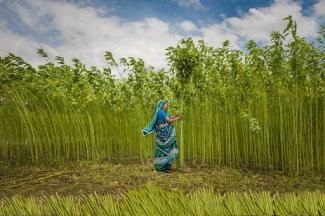USAID’s vision for a sustainable, secure and prosperous future for all is increasingly threatened by unprecedented environmental degradation, climate change, and inadequate infrastructure to sustain improvements in human welfare. The advancement of our vision in the context of these challenges requires the integration of gender equality and women’s empowerment throughout environment, energy, and climate change programming around the world. We know that environment, energy and climate change programming is strengthened when it is responsive to the insights and knowledge held by women and girls, particularly those facing multiple and intersecting forms of exclusion.
In alignment with the U.S. National Strategy on Gender Equity and Equality, the USAID 2023 Gender Equality and Women's Empowerment Policy, and the USAID Climate Strategy 2022-2030, USAID is driving action that bridges two of the most important issues of our day: gender equality and climate change. By integrating inclusive and gender-equitable approaches to its environment, climate and energy work, USAID is enabling the transformation of equitable and resilient communities around the world.
Biodiversity, Conservation and Natural Resources Management Programming: Changes to ecosystems affect women and men in different ways, with gender inequalities rooted in social and legal norms shaping the roles and responsibilities related to natural resources. This can affect how women and men, respectively, access and benefit economically from them, impacting livelihoods and community resilience. Control over and access to natural resources can be a source of conflict and can lead to forms of exploitation such as gender-based violence, which can be a key mechanism for maintaining power. USAID recognizes that supporting women’s leadership and meaningful inclusion of women in biodiversity conservation and natural resource management can lead to a more sustainable use of resources, reduction of conflict, and more equitable benefits for all users. As part of its efforts to contribute to women’s leadership and meaningful inclusion efforts USAID, in partnership with Advancing Gender in the Environment (AGENT), is implementing the Resilient, Inclusive and Sustainable Environments (RISE) grants challenge, the first-of-its-kind to address gender-based violence (GBV) in natural resource management and environment contexts.
Land and Property Rights Programming: Globally, women are often the primary laborers and users of land, yet their rights to land, resources and property often go unrecognized. USAID knows that when these rights are secure, the results include higher economic gains, improved access to markets, new entrepreneurial opportunities, increased empowerment to make household decisions, more efficient and sustainable land use, increased agricultural investment and production and improved food security. USAID works to improve women's access to and control of land, resources and property by supporting efforts to draft and adopt gender-equitable land and resource laws and policies, strengthening women’s participation in land and natural resource governance institutions, working with the private sector to support women’s land rights, and by mitigating gender-based violence arising from potential backlash to shifting power dynamics as women gain more influence and resources.
Climate Programming: USAID recognizes climate change’s disproportionate impact on women and girls and is committed to enabling and empowering women and girls, in all of their diversity, as leaders and agents of change for climate action. In its 2022-2030 Climate Strategy, USAID committed to integrating rights-based, gender-responsive and socially inclusive approaches throughout efforts to ensure sustainable climate impacts. USAID recognizes women as decision-makers, stakeholders, educators and experts whose leadership is key to producing more equitable and sustainable solutions to climate change.
Energy, Mining and Infrastructure Programming: A lack of access to energy can lock women and girls into poverty and affect all areas of their lives. A shortage of women’s leadership in the clean-energy sector may undermine low-emission development goals. Numerous studies show that when women are recognized as leaders and employees, businesses benefit and company performance improves. Strengthening women’s representation in the energy, mining and infrastructure sectors is essential to ensuring that projects in these sectors meet the needs of all people. USAID advances gender-responsive programming in energy, mining and infrastructure sectors, including the Engendering Industries program. Engendering Industries, established in 2016, advances gender equality in traditionally male-dominated sectors by supporting organizations to increase economic opportunities for women and to improve gender equality in the workplace.
USAID’s Gender Equality and Women’s Empowerment Hub supports gender integration across the Agency’s wide range of environment, climate and energy programs around the world. This work complements the Agency’s broader investments in gender equality, environment, energy and climate mitigation, adaptation and resilience, with activities conducted in partnership with civil society, national governments and the private sector.
Related Links
- LandLinks Gender Page
- ClimateLinks Gender Page
- Biodiversity Links Gender and Biodiversity Page
- Engendering Industries - Strengthening Organizations in Male-Dominated Industries through Gender Equality Initiatives
- AGENT - Advancing Gender in the Environment
- Gender-Based Violence and Environment (GBV-ENV) Center

